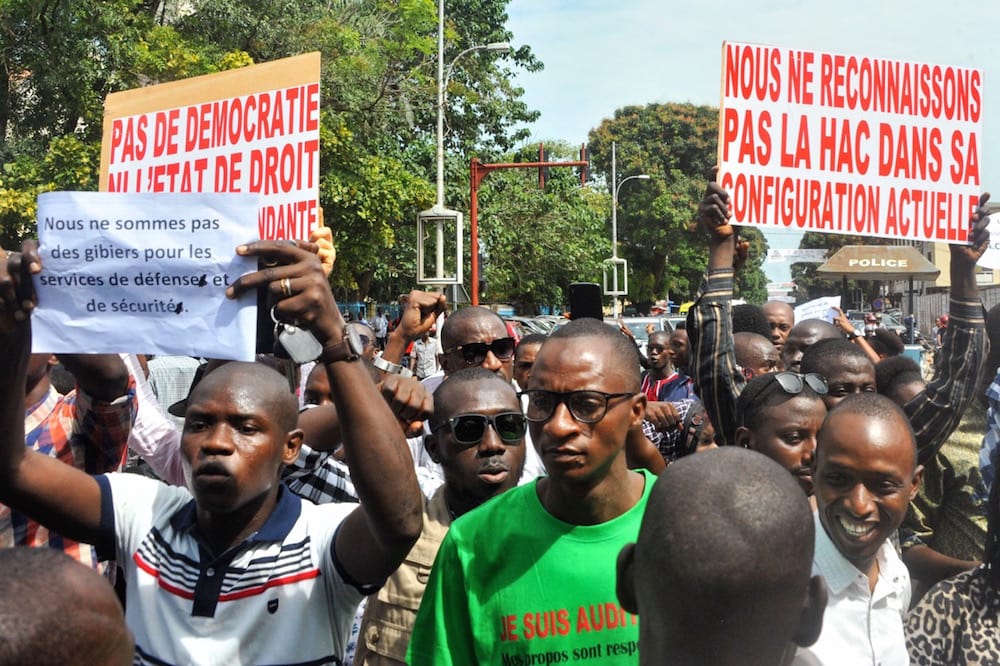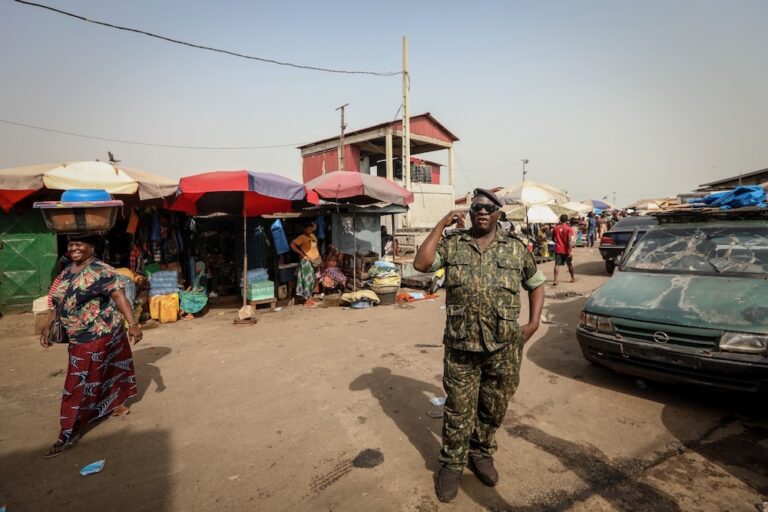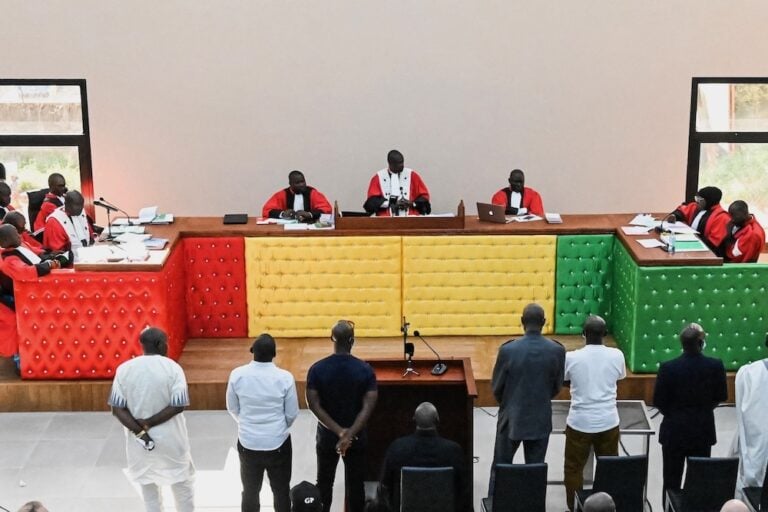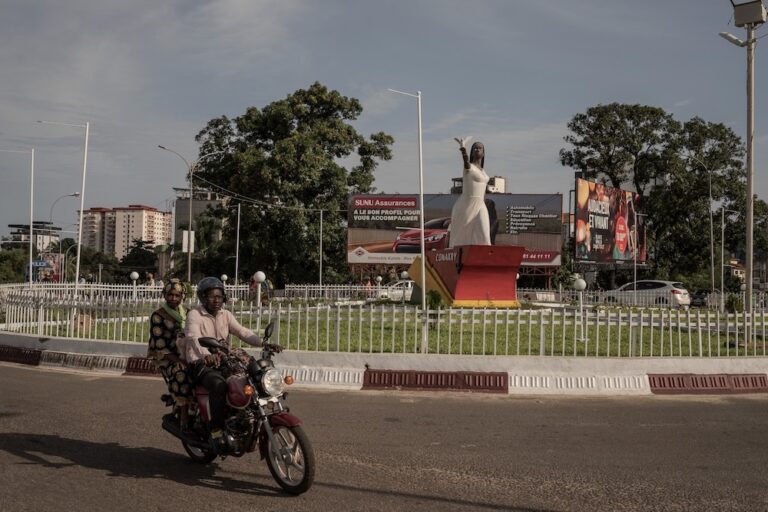The presidential appointment of Boubabacar Yacine Diallo as the new head of Haute Autorité de la Communication (HAC) is being seen as a move to control Guinea's media sector.
This statement was originally published on africafex.org on 28 August 2020.
President Alpha Conde has appointed by decree Boubabacar Yacine Diallo as the new head of the Haute Autorité de la Communication (HAC) a move that has been described as an attempt to control the media in Guinea.
The appointment of Diallo follows a law passed by Guinea’s new Parliament on July 3, 2020, which gives President Conde the power to choose the head of the media regulatory body. Previously, the head of the regulatory body was appointed by their peers.
The new Law 003 / CNT /2020 which replaces Law /2010/03/CNT of June 2010 governing the composition and functions of the HAC, also increased the Head of State’s appointees on the board from one to three. Given that the HAC president in turn designates the heads of the authority’s five specialized commissions, the arrangement is feared to give the executive too much control over the media regulator.
Sidy Diallo, a leader of the private media professionals’ trade union, Syndicat des Professionnels de la Presse Privée de Guinée (SPPG), articulated such fears in an interview with local media.
“We are concerned because, in a nutshell, considering the interpretation of this law, we realise that the State wants to control the HAC, the State wants to control the media in this country,” he lamented.
The appointment of Diallo, a former Chairperson of the regulatory body then called Conseil national de communication, was announced on August 25, 2020. A former Director General of the national broadcaster and ex-Minister of Information, the new HAC boss is also the owner of Radio Horizon FM located in Conakry and Kankan.
Aboubacar Algassimou Diallo, a journalist with Lynx FM, reacted to the appointment with cautious optimism in an interview with the MFWA.
“There could not have been a more qualified candidate. Yacine Diallo is a true professional. I just hope that he proves to be the redeeming feature for the new HAC whose composition has raised a lot of concern. I maintain that the change in the law to allow the President to nominate the HAC president and to have two additional nominees on the Board is a major setback. It strengthens perceptions that the Executive wants to control the media through the HAC and further reduces confidence in the independence of the regulator. Restoring this confidence in the HAC is part of the challenge that Diallo will face, and I hope he succeeds,” Diallo said.
Even under the previous dispensation when the HAC presidents were elected by their fellow commissioners, the regulatory body was often criticised for not being proactive and robust enough in defending the media from violations by state actors.
On November 3, 2017, six media professional associations took the HAC to task for what it described as the regulator’s total disregard for the media and indifference to their ordeal. In a statement signed by their respective leaders, the six associations, URTELGUI, AGEPI, AGUIPEL, APAC, UPLG and REMIGUI announced that they had planned a “march of anger against the abuses and oppression that the national private media have suffered at the hands of the Haute Autorité de Communication.” They said they did not recognise the regulatory body as it was then constituted and announced that they were recalling their representatives from the institution in order to replace them with more professional agents.
On August 26, 2019, media professionals from the private media stormed the offices of the media regulatory body HAC in a sit-in protest following a series of arrests, detentions and intimidating interrogations of journalists by security agents.
The HAC has also been accused in the past of colluding with the government to censor critical foreign correspondents. On October 17, 2019, the police in Conakry detained Dakar-based Al Jazeera reporter, Nicolas Haque, and his cameraman Hugo Bogaeert, for several hours. The police alleged that the journalists were “spying and undermining state security.” The HAC followed suit by announcing that it had withdrawn the journalists’ accreditation for producing “ethnocentric reports.”
On March 6, 2020, the government deported a French journalist, Thomas Pierre Dietrich. A day later, the Ministry of Security and Civil Protection explained that it had cancelled the journalist’s visa for “engaging himself in internal political activities liable to undermine public order.” Once again, the regulator came out in support of the perpetrator by confirming that it had withdrawn the journalist’s accreditation for exceeding the limits of his permit.
In one of its last acts before leaving office, the HAC headed by Martine Conde in June 2020 summoned the managers of three radio stations, Nostalgie FM, Espace and Lynx FM and asked them to stop broadcasting a publicity spot sponsored by a leading anti-government coalition. The spot from the Front pour la Defense de la Constitution (FNDC) calls on the populace to continue the resistance. It says “A case has been filed at the International Criminal Court against this dictatorial regime for committing a crime against humanity.” The regulatory body told the media outlets that the message was subversive and defamatory. Some media reports said the HAC cautioned the radio stations after it had itself been summoned by the Speaker of Parliament, Amadou Damaro Camara.
The order has been described as an act of censorship against the media organisations concerned and a violation of the country’s laws.
“Article 125 of Guinea’s April 2020 Constitution prescribes the principle of separation of powers. The order from the Speaker of parliament for the HAC to stop the radio stations from broadcasting the FNDC’s publicity spot therefore violates the constitution,” Moussa Iboun Conte, president of the Editors’ guild, Association guineene des editeurs de la presse independante (AGEPI) protested in an interview with the MFWA.
Guinea is heading into presidential elections in less than two months. The media is expected to be a key player in the process; informing, educating, and providing a platform for the citizens to access and evaluate the competing development and solution proposals of the various parties and candidates. To perform this role optimally and ensure an effective and incident-free media coverage of the upcoming elections, the media sector must be vibrant and mutually-reinforcing.
The Media Foundation for West Africa (MFWA) therefore urges the incoming commissioners of the HAC to initiate dialogue with the media and demonstrate a real commitment to promote press freedom and safety of journalists in Guinea. In the meantime, the HAC must fashion out strategies to help the media to carry out effective and incident-free media coverage of the upcoming elections.
Members of AFEX:
ADISI-Cameroon
Africa Freedom of Information Centre
Association for Media Development in South Sudan
Center for Media Studies and Peace Building
Collaboration on International ICT Policy in Eastern and Southern Africa (CIPESA)
Freedom of Expression Institute
Gambia Press Union (GPU)
Human Rights Network for Journalists – Uganda
Institute for Media and Society
International Press Centre
Journaliste en danger
Media Foundation for West Africa
Media Institute of Southern Africa
Media Rights Agenda
West African Journalists Association



